Feast of the Exaltation of
the Holy Cross
September 14, 2014 Cycle A
Red priestly vestments symbolize the supreme sacrifice of life for the love of
God.
Home Page
Liturgical
Year Cycle A 13-14
Introductory Acts Of Worship
The Entrance Prayers:
On Sunday, usually a hymn praising God
is sung in place of reciting a Psalm from the Bible which invites us to
enter more deeply into the mystery of God's love for us. The recited
weekday Psalm expresses a youthful heart and spirit, delighted that we may come
before the living God.
Entrance Song
/ Entrance Psalm (Antiphon)
Entrance Song
Galatians 6:14 We should glory in
the Cross of our Lord Jesus Christ, in whom is our salvation, life and
resurrection, through whom we are saved and delivered.
The Priest Approaches and Kisses the Altar:
The
altar is a symbol of Christ. In it are cut five crosses to recall the five
wounds of Christ. The altar also represents the Church and has embedded in
it the relics of her saints. The priest comes to the altar to celebrate
the Sacrifice in the Church's name. Because of the glory surrounding the
altar upon which the divine Sacrifice will be made, the kiss of the priest
unites the Church to Christ, its Redeemer.
Priest:
In the name of the Father, and of the Son, and of the Holy Spirit.
All:
Amen.
The Greeting:
We are welcomed in God's name. Our
response unites us to our neighbor, to the priest and to God. (The priest
may select from several forms of greeting).
Priest: The Lord
be with you.
All:
And with your spirit.
The Penitential Prayers:
We recognize our guilt for past sins,
express our sorrow for them, and ask that Mary, the angels, the saints, and our
brothers and sisters in Christ pray for the Lord God's mercy. (The priest
may select from several forms).
Priest: Brothers and sisters, let
us acknowledge our sins, and so prepare ourselves to celebrate the sacred
mysteries.
Priest: Have mercy on us O Lord.
All: For we have sinned against you.
Priest: Show us, O Lord, your mercy.
All: And grant us your salvation.
The Absolution:
Priest: May almighty God have
mercy on us, forgive us our sins, and bring us to everlasting life.
All:
Amen.
The Gloria:
The Glory of God prayers have existed from
the second century. They repeat the angels praise of God which heralded
the birth of Christ on earth. Our praise is lifted again through the years
as we rejoice at His coming as Lord, God, the most high Jesus Christ, who at
Christmas took on our human nature while at the same time being the son of Man.
This ancient hymn expresses our recognition of God's glory and love. It
calls upon Christ as our holy and divine mediator, and the Holy Spirit who
forever binds us together in God's love.
Priest and All:
Glory to God in the highest, and on earth
peace to people of good will. We praise you, we bless you, we adore you,
we glorify you, we give you thanks for your great glory. Lord God,
heavenly King, O God, almighty Father. Lord Jesus Christ, Only Begotten
Son, Lord God, Lamb of God, son of the Father, you take away the sins of the
world, have mercy on us; you take away the sins of the world, receive your
prayer; you are seated at the right hand of the Father, have mercy on us.
For you alone are the Holy One, you alone are the Lord, you alone are the most
High, Jesus Christ, with the Holy Spirit, in the glory of God the Father.
Amen.
The Collect:
The
priest lifts the united prayers and petitions of the congregation to God the
Father through the merits of Jesus Christ in the Holy Spirit.
Priest: O God, who willed that your Only Begotten Son should
undergo the Cross to save the human race, grant, we pray, that we, who have
known his mystery on earth, may merit the grace of his redemption in heaven.
Through our Lord Jesus Christ, your Son, who lives and reigns with you in the
unity of the Holy Spirit, one God, for ever and ever.
Liturgy of the Word
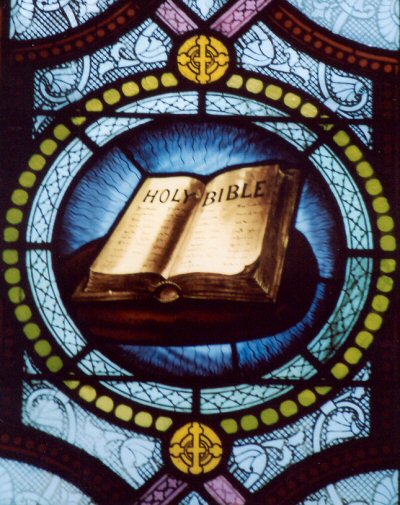 Christ is made known to us through the
Old Testament which prepares us to recognize Him. In those days, God
inspired men who spoke His message. Now, the New Testament Gospel reading
announces His presence to us directly through His Son. Both
readings bring God's message to us. Our responsibility is to respond.
Christ is made known to us through the
Old Testament which prepares us to recognize Him. In those days, God
inspired men who spoke His message. Now, the New Testament Gospel reading
announces His presence to us directly through His Son. Both
readings bring God's message to us. Our responsibility is to respond.
The First Reading:
From the Old Testament
Priest/Reader: A reading from the
book, Acts of the Apostles.
First Reading: Numbers 21:4b-9
With their patience worn
out by the journey, the people complained against God and Moses, "Why have you
brought us up from Egypt to die in this desert, where there is no food or water?
We are disgusted with this wretched food!?
In punishment the Lord
sent among the people saraph serpents, which bit the people so that many of them
died. Then the people came to Moses and said, "We have sinned in
complaining against the Lord and you. Pray the Lord to take the serpents
from us." So Moses prayed for the people, and the Lord said to Moses,
"Make a saraph and mount in on a pole, and if any who have been bitten look at
it, they will live." Moses accordingly made a bronze serpent and mounted
it on a pole, and whenever anyone who had been bitten by a serpent looked at the
bronze serpent, he lived.
Priest/Reader:
The Word of the
Lord.
All: Thanks
be to God.
The Responsorial Psalm:
This Psalm praising God, is a prayer to God,
or recommends the practice of virtue. It is sung as an interlude between
the scriptural readings. It provides yet another instructional setting and
invites the assembly to imitate the cantor who sings a repeated response to the
verses of an ancient Psalm many of which are attributed to King David. The
verses are sung first by a cantor (song leader) accompanied by instruments, the
refrain is sung by the people.
Psalm 78:1bc-2, 34-35, 36-37, 38
Cantor: Do not forget the works of the Lord!
All:
Do not forget the works of the Lord!
Cantor: Harken, my people, to my
teaching; incline your ears to the words of my mouth. I will open my mouth
in a parable, I will utter mysteries from of old.
All: Do not forget the works of the Lord!
Cantor: While he slew them they sought him and inquired after God
again, remembering that God was their rock and the Most High God, their
redeemer.
All: Do not forget the works of the Lord!
Cantor: But they flattered him with their mouths and lied to him with
their tongues, though their hearts were not steadfast toward him, nor were they
faithful to his covenant.
All: Do not forget the works of the Lord!
Cantor: But he, being merciful, forgave their sin and destroyed
them not; often he turned back his anger and let none of his wrath be roused.
All: Do not forget the works of the Lord!
The Second Reading:
Taken from the New Testament, often from a
letter written by St. Paul.
Second Reading: Philippians 2:6-11
Brothers and sisters: Christ Jesus, though he was in the form of God, did
not regard equality with God something to be grasped. Rather, he emptied
himself, taking the form of a slave, coming in human likeness; and found human
in appearance, he humbled himself, becoming obedient to death, even death on a
cross. Because of this, God greatly exalted him and bestowed on him the
name that is above every name, that at the name of Jesus every knee should bend,
of those in heaven and on earth and under the earth, and every tongue confess
that Jesus Christ is Lord, to the glory of God the Father.
The Alleluia:
An ancient expression of joy anticipating
the Lord's message we will hear in the Gospel.
Cantor: Alleluia!
Alleluia! Alleluia!
All:
Alleluia! Alleluia! Alleluia!
Cantor: We adore you, O Christ, and we bless you,
because by your Cross you have redeemed the world.
All: Alleluia!
Alleluia! Alleluia!
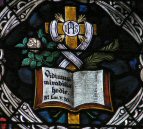 The Gospel:
The Liturgy of the Word is completed
by the reading of the Gospel. Before its reading, the members of the
assembly trace the sign of the cross upon the forehead to indicate their mental
acceptance of the Truth, on the lips to indicate their readiness to announce it,
and over the heart to indicate their sincere desire to accept it into their
lives. The "Good News" of the Gospel tells that God's kingdom has come for
all to hear, accept, and announce to the world for its salvation. It
is God who is speaking to us. Christ comes to teach us by the example of
His life and by His own words.
The Gospel:
The Liturgy of the Word is completed
by the reading of the Gospel. Before its reading, the members of the
assembly trace the sign of the cross upon the forehead to indicate their mental
acceptance of the Truth, on the lips to indicate their readiness to announce it,
and over the heart to indicate their sincere desire to accept it into their
lives. The "Good News" of the Gospel tells that God's kingdom has come for
all to hear, accept, and announce to the world for its salvation. It
is God who is speaking to us. Christ comes to teach us by the example of
His life and by His own words.
Priest: Cleanse my heart and my lips, almighty God, that I may worthily proclaim your
holy Gospel. Through the words of the Gospel may our sins be wiped away.
Priest: The Lord be with you.
All: And
also with your spirit.
Priest/Deacon: A
reading from the holy Gospel according
to John.
All: Glory
to you, Lord.
The Gospel: John 3:13-17
John wrote to show that Christ was
the Messiah, the Divine Son of God.
 Jesus
said to Nicodemus: "No one has gone up to heaven except the one who has come
down from heaven, the Son of Man. And just as Moses lifted up the serpent
in the desert, so must the Son of Man be lifted up, so that everyone who
believes in him may have eternal life."
Jesus
said to Nicodemus: "No one has gone up to heaven except the one who has come
down from heaven, the Son of Man. And just as Moses lifted up the serpent
in the desert, so must the Son of Man be lifted up, so that everyone who
believes in him may have eternal life."
For
God so loved the world that he gave his only Son, so that he who believes in him
might not perish but might have eternal life. For God did not send his Son
into the world to condemn the world, but that the world might be saved through
him."
Priest/Deacon: The Gospel of the Lord.
All: Praise
to you, Lord Jesus Christ.
The Priest's Sermon:
The priest develops, explains, and comments upon the Master's words,
so our minds may be
enlightened, and our
hearts enriched.
(A priestly reflection upon this Gospel)
Profession of Faith:
We state in the
Nicene Creed the principles of our faith in precise and definite terms.
All: I believe in one God, the Father, the Almighty,
maker of heaven and earth, of all that is seen and unseen. I believe in
one Lord, Jesus Christ, the Only Begotten Son of God, born of the Father before
all ages.
God from God, Light from Light, true God from true God, begotten, not made,
consubstantial with the Father; through him all things were made. For us
men and for our salvation he came down from heaven, and by the Holy
Spirit was incarnate of the Virgin Mary, and became man. For our sake he was
crucified under Pontius Pilate, he suffered death and was buried, and rose again
on the third day in accordance with the Scriptures. He ascended into
heaven and is seated at the right hand of the Father. He will come again
in glory to judge the living and the dead and his kingdom will have no end.
I believe in the Holy Spirit, the Lord, the giver of life, who proceeds from
the Father and the Son, who with the Father and the Son is adored and
glorified, who has spoken through the prophets. I believe in one,
holy, catholic and apostolic Church. I confess one Baptism for the
forgiveness of sins and I look for the resurrection of the dead and the
life of the world to come. Amen.
General Intercessions:
We pray for the needs of the pope, civic
leaders, our own needs, those of others,
the sick, the dying, those who have died, the church, and the world.
The response of all to each intercession: Lord, hear our prayer.
All: Lord,
hear our prayer.
The Liturgy of the Eucharist
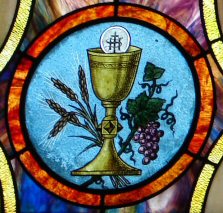 Gifts of bread and wine
symbolizing ourselves are presented to the priest who will offer them to God the
Father. Through the Holy Spirit, they will become the Body and Blood of
Jesus Christ whom we receive in Holy Communion. Jesus unites Himself with
us for our spiritual nourishment and strength. Today, when individuals do
not present their own personal offerings of bread and wine, the monetary contribution
symbolizes the material of their united sacrifice. The priest makes and
offering of the bread and wine to God.
Gifts of bread and wine
symbolizing ourselves are presented to the priest who will offer them to God the
Father. Through the Holy Spirit, they will become the Body and Blood of
Jesus Christ whom we receive in Holy Communion. Jesus unites Himself with
us for our spiritual nourishment and strength. Today, when individuals do
not present their own personal offerings of bread and wine, the monetary contribution
symbolizes the material of their united sacrifice. The priest makes and
offering of the bread and wine to God.
Preparation of the Bread and
Wine:
Priest: Blessed are you, Lord God of all creation,
for through your goodness we have received the bread we offer you:
fruit of the earth and work of human hands, it will become for us the bread of
life.
All: Blessed be God for ever.
Priest: By
the mystery of this water and wine may we come to share in the divinity of
Christ, who humbled himself to
share
in our humanity.
Priest: Blessed are you, Lord God of all creation, for through your goodness we have
received the wine we offer you; fruit
of the vine and work of human hands it will become our spiritual drink.
All: Blessed be God for ever.
Priest: With
humble spirit and contrite heart may we be accepted by you, O Lord, and may our
sacrifice in your sight this
day be pleasing to you, Lord God.
The Priest's Hands are Washed: This
act was traditionally necessary because the priest handled the various gifts
presented by the people. Now, the cleansing act using water reminds the
priest and ourselves of the need to cleanse not only the hands but the soul.
Soon, the priest's hands will hold the actual body of Christ, and we will become
His dwelling place.
Priest: Wash
me o Lord, from my iniquity and cleanse me from my sin.
Pray, brethren, that
my sacrifice and yours may be acceptable to God, the almighty Father.
All: May the Lord accept the sacrifice at your hands for the praise and glory of his
name, for our good and the good of
all his holy Church.
Prayer over the Gifts:
Speaking in our name, the priest asks
the Father to accept the gifts we offer through him.
Priest: May
this oblation, O Lord, which on the altar of the Cross canceled the offense of
the whole world, cleans us, we pray, of all our sins. Through Christ our
Lord.
Eucharistic Prayer:
(Number Four: The priest may select from several forms).
Priest: The Lord be with you.
All: And with your
spirit.
Priest: Lift up your hearts.
All: We lift them up to the Lord.
Priest: Let us give thanks to the Lord, our God.
All: It is right
and just.
Preface Prayer:
Priest: It
is truly right and just, our duty and our salvation, always and everywhere to
give you thanks, Lord, holy Father, almighty and eternal God. For you
placed the salvation of the human race on the wood of the Cross, so that, where
death arose, life might again spring forth and the evil one, who conquered on a
tree, might likewise on a tree be conquered, through Christ our Lord.
Through him the Angels praise your majesty, Dominions adore and Powers tremble
before you. Heaven and the Virtues of heaven and the blessed Seraphim
worship together with exultation. May our voices, we pray, join with
theirs to humble praise, as we acclaim:
Acclamation:
Priest
/ All:
Holy, Holy, Holy Lord, God of power and might, Heaven and
earth are full of your glory. Hosanna in the highest. Blessed
is he who comes
in the name of the Lord. Hosanna in the highest.
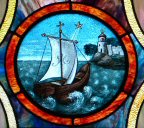
Priest:
We give you praise, Father most holy, for you are great and you have
fashioned all your works in wisdom and in love. You formed man in your own
image and entrusted the whole world to his care, so that in serving you alone,
the Creator, he might have dominion over all creatures. And when through
disobedience he had lost your friendship, you did not abandon him to the domain
of death. For you came in mercy to the aid of all, so that those who seek
might find you. Time and again you offered them covenants and through the
prophets taught them to look forward to salvation.
And you so loved the world, Father most holy,
that in the fullness of time you sent your Only Begotten son to be our Savior.
Made incarnate by the Holy Spirit and born of the Virgin Mary, he shared our
human nature in all things but sin. To the poor he proclaimed the good
news of salvation, to prisoners, freedom, and to the sorrowful of heart, joy.
To accomplish your plan, he gave himself up to death, and, rising from the dead,
he destroyed death and restored life.
And that we might live no longer for ourselves but
for him who died and rose again for us, he sent the Holy Spirit from you,
Father, as the first fruits for those who believe, so that, bringing to
perfection his work in the world, he might sanctify creation to the full.
Therefore, O Lord, we pray: ma this same Holy
Spirit graciously sanctify these offerings, that they may become the Body and
Blood of our Lord Jesus Christ for the celebration of this great mystery, which
he himself left us as an eternal covenant.
The priest repeats the words which
Christ used at his Last Supper when He changed the bread into His Body and the
wine into His Blood. His Body and Blood are truly present but under the
appearance of bread and wine. The death of Christ is prolonged in each of
those who receive Him worthily. We apply His death to ourselves so that we
may share His glory. This moment is the most solemn on earth because it is
Divine act which enables us to apply to ourselves the Cross which Christ
willingly took upon Himself.
We are called to die to
sin and lift our very selves to God so that we become changed; to do as God
would have us do, to become what
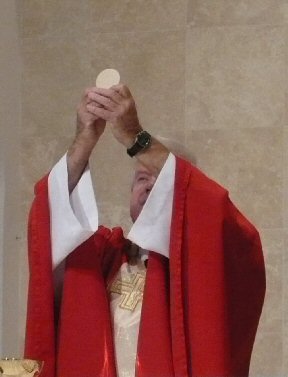 God
would have us become. Our own little cross can lift us into union with
Christ's Cross so we may earn the joys of everlasting happiness with God the
Father.
God
would have us become. Our own little cross can lift us into union with
Christ's Cross so we may earn the joys of everlasting happiness with God the
Father.
The
Lord's Supper:
For when the hour had come for him to be
glorified by you, Father most holy, having loved his own who were in the world,
he loved them to the end: and while they were at supper, he took bread, blessed
and broke it, and gave it to his disciples, saying:
Take this, all of you, and eat of it, for this is my Body, which will be given
up for you.
In a similar way taking the chalice filled
with the fruit of the vine, he gave thanks, and gave the chalice to his
disciples, saying:
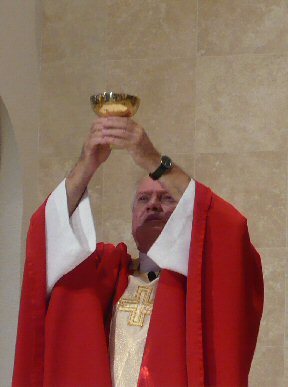 Take this, all of you, and drink from it, for
this is the chalice of my Blood, the Blood of the new and eternal covenant,
which will be poured out for you and for many for the forgiveness of sins.
Do this in memory of me.
Take this, all of you, and drink from it, for
this is the chalice of my Blood, the Blood of the new and eternal covenant,
which will be poured out for you and for many for the forgiveness of sins.
Do this in memory of me.
Memorial Acclamation: (The priest may
select from several forms).
Priest: The
mystery of faith.
Priest
/ All: When we
eat this Bread and drink this Cup, we proclaim your Death, O Lord, until you
come again.
Therefore, O Lord, as we now celebrate the
memorial of our redemption, we remember Christ's Death and his descent to the
realm of the dead, we proclaim his Resurrection and his Ascension to your right
hand, and, as we await his coming in glory, we offer you his body and Blood, the
sacrifice acceptable to you which brings salvation to the whole world.
Look, O Lord, upon the Sacrifice which you
yourself have provided for your Church, and grant in your loving kindness to all
who partake of this one Bread and one chalice that, gathered into one body by
the Holy Spirit, they may truly become a living sacrifice in Christ to the
praise of your glory.
Therefore, Lord, remember now all for whom we
offer this sacrifice: especially your servant ____ our Pope, ____ our Bishop,
and the whole Order of Bishops, all the clergy, those who take part in this
offering, those gathered here before you, your entire people, and all who seek
you with a sincere heart. Remember also those who have died in the peace
of your Christ and all the dead, whose faith you alone have known.
To all of us, your children, grant, O
merciful Father, that we may enter into a heavenly inheritance with the Blessed
Virgin Mary, Mother of God, with Blessed Joseph her spouse, and with your
Apostles and Saints in your kingdom.
There, with the whole of creation, freed from
the corruption of sin and death, may we glorify you through Christ our Lord,
through whom you bestow on the world all that is good.
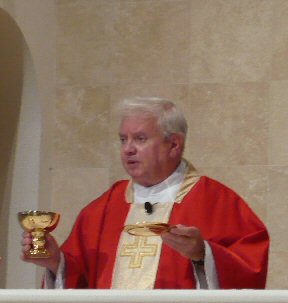 Doxology:
Doxology:
Prayer of Praise:
Through
him, with him, and in him, O God, almighty Father, in the unity of the Holy
Spirit, all glory and honor is yours, for ever and ever.
All: Amen.
Communion Rite
In the Liturgy of the Eucharist, we
symbolically offer ourselves to the Lord through the gifts of bread and wine.
At the Consecration, we offer our very lives to be united the God the Father
through the Cross of Christ. In Communion, we find that we have not died
at all, but have come to life. We have surrendered ourselves to God
through His Divine Son, Jesus Christ. In return become ennobled and
enriched. We give up time and we get eternity, we give up our sin and we
receive grace, we surrender our self-will and receive the strength of the Divine
Will, we give up ourselves and we receive everything. For the Son of God
says to us that unless we receive Him we shall not have Divine life in us.
But it is not really we who receive Christ as it is Christ who receives us,
bringing us into Himself.
God makes His Cross the very means
of our salvation and our life. While we have crucified Him, His eternal
love cannot be extinguished. Christ willed to give us the very life we
crucified in our Redemption, the Consecration of Holy Thursday into Communion,
His death into our everlasting life.
The Lord's
Prayer:
Priest: Jesus taught us to call God our Father, and so we have
the courage to say:
Priest and
All: Our
Father, who art in heaven, hallowed be they name; Thy kingdom come; Thy will be
done on earth as it is in
heaven. Give us this
day our daily bread; and forgive us our trespasses as we forgive those who
trespass against us; and lead us not into temptation, but deliver us from evil.
All: For the kingdom, the power and
the glory are yours, now and for ever.
Prayer for
Peace:
Priest and All: Lamb of God, you take away the sins of the
world, have mercy on us.
Lamb of God, you take away the sins of the world, have mercy on us.
Lamb
of God, you take away the sins of the world, grant us peace.
Communion of
the Priest:
Priest: May the receiving of your Body
and Blood, Lord Jesus Christ, not bring me to judgment and condemnation, but
through your loving mercy be fore me protection in mind and body and a healing
remedy.
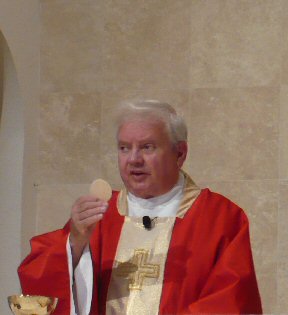 Priestly Preparation: Lord Jesus Christ, Son of the living God, who by the will of the Father and the
work of the Holy Spirit, through
your death gave life to the world. By your holy body and blood free me
from all my sins, and from every evil. Keep me faithful to your teaching,
and never let me be parted from you.
Priestly Preparation: Lord Jesus Christ, Son of the living God, who by the will of the Father and the
work of the Holy Spirit, through
your death gave life to the world. By your holy body and blood free me
from all my sins, and from every evil. Keep me faithful to your teaching,
and never let me be parted from you.
Priest: This is the Lamb of God who takes away the sins of the world. Happy are
those who are called to his supper.
Priest and All: Lord,
I am not worthy to receive you, but only say the word and I shall be healed.
Priest: May the Body of Christ keep me safe for eternal life.
May the Blood of Christ keep me safe for eternal life.
Communion Antiphon:
John 12:32 When I am lifted up from
the earth, I will draw everyone to myself, says the Lord.
Communion of the Faithful:
Priest: The Body of Christ.
The Faithful: Amen.
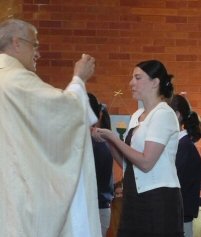
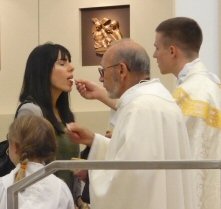
Priest/Deacon/
Extraordinary Eucharistic Minister:
The Blood of Christ.
The Faithful: Amen.
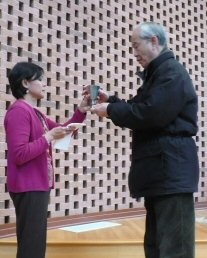
Cleansing of the Vessels:
Priest: Lord,
may I receive these gifts in purity of heart. May they bring me healing
and strength, now and for ever.
Prayer after Communion:
Priest: Let us pray.
Priest: Having been nourished by your holy banquet, we beseech you,
Lord Jesus Christ, to bring those you have redeemed by the wood of your
life-giving Cross to the glory of the resurrection. Who live and reign for
ever and ever.
Concluding Rite
Priest: The Lord be with you.
All: And
with your spirit.
Priest: Bow
down for the blessing.
Dismissal Prayer: (The priest may select
from several forms)
Priest: Keep your family, we pray, O Lord, in your constant care,
so that, under your protection, they may be free from all troubles and by good
works show dedication to your name. Through Christ our Lord.
All: Amen.
Priest: And may the blessing of almighty God, the Father, and the
Son, and the Holy Spirit, come down on you and remain with you for ever.
All: Amen.
Priest: Go in peace, glorifying the Lord by your life.
All: Thanks be to God.
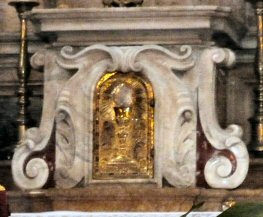 O my Jesus, forgive us our sins.
O my Jesus, forgive us our sins.
Save us from the fires of hell.
Lead all souls to heaven,
especially those in most need of your mercy.
www.Divinemasterplanforlife.com
www.Saintsnheaven.com
Top
Home Page
Liturgical
Year Cycle A 13-14
 Christ is made known to us through the
Old Testament which prepares us to recognize Him. In those days, God
inspired men who spoke His message. Now, the New Testament Gospel reading
announces His presence to us directly through His Son. Both
readings bring God's message to us. Our responsibility is to respond.
Christ is made known to us through the
Old Testament which prepares us to recognize Him. In those days, God
inspired men who spoke His message. Now, the New Testament Gospel reading
announces His presence to us directly through His Son. Both
readings bring God's message to us. Our responsibility is to respond. The Gospel:
The Liturgy of the Word is completed
by the reading of the Gospel. Before its reading, the members of the
assembly trace the sign of the cross upon the forehead to indicate their mental
acceptance of the Truth, on the lips to indicate their readiness to announce it,
and over the heart to indicate their sincere desire to accept it into their
lives. The "Good News" of the Gospel tells that God's kingdom has come for
all to hear, accept, and announce to the world for its salvation. It
is God who is speaking to us. Christ comes to teach us by the example of
His life and by His own words.
The Gospel:
The Liturgy of the Word is completed
by the reading of the Gospel. Before its reading, the members of the
assembly trace the sign of the cross upon the forehead to indicate their mental
acceptance of the Truth, on the lips to indicate their readiness to announce it,
and over the heart to indicate their sincere desire to accept it into their
lives. The "Good News" of the Gospel tells that God's kingdom has come for
all to hear, accept, and announce to the world for its salvation. It
is God who is speaking to us. Christ comes to teach us by the example of
His life and by His own words. Jesus
said to Nicodemus: "No one has gone up to heaven except the one who has come
down from heaven, the Son of Man. And just as Moses lifted up the serpent
in the desert, so must the Son of Man be lifted up, so that everyone who
believes in him may have eternal life."
Jesus
said to Nicodemus: "No one has gone up to heaven except the one who has come
down from heaven, the Son of Man. And just as Moses lifted up the serpent
in the desert, so must the Son of Man be lifted up, so that everyone who
believes in him may have eternal life." Gifts of bread and wine
symbolizing ourselves are presented to the priest who will offer them to God the
Father. Through the Holy Spirit, they will become the Body and Blood of
Jesus Christ whom we receive in Holy Communion. Jesus unites Himself with
us for our spiritual nourishment and strength. Today, when individuals do
not present their own personal offerings of bread and wine, the monetary contribution
symbolizes the material of their united sacrifice. The priest makes and
offering of the bread and wine to God.
Gifts of bread and wine
symbolizing ourselves are presented to the priest who will offer them to God the
Father. Through the Holy Spirit, they will become the Body and Blood of
Jesus Christ whom we receive in Holy Communion. Jesus unites Himself with
us for our spiritual nourishment and strength. Today, when individuals do
not present their own personal offerings of bread and wine, the monetary contribution
symbolizes the material of their united sacrifice. The priest makes and
offering of the bread and wine to God.

 God
would have us become. Our own little cross can lift us into union with
Christ's Cross so we may earn the joys of everlasting happiness with God the
Father.
God
would have us become. Our own little cross can lift us into union with
Christ's Cross so we may earn the joys of everlasting happiness with God the
Father.
 Take this, all of you, and drink from it, for
this is the chalice of my Blood, the Blood of the new and eternal covenant,
which will be poured out for you and for many for the forgiveness of sins.
Do this in memory of me.
Take this, all of you, and drink from it, for
this is the chalice of my Blood, the Blood of the new and eternal covenant,
which will be poured out for you and for many for the forgiveness of sins.
Do this in memory of me. Doxology:
Doxology:
 Priestly Preparation: Lord Jesus Christ, Son of the living God, who by the will of the Father and the
work of the Holy Spirit, through
your death gave life to the world. By your holy body and blood free me
from all my sins, and from every evil. Keep me faithful to your teaching,
and never let me be parted from you.
Priestly Preparation: Lord Jesus Christ, Son of the living God, who by the will of the Father and the
work of the Holy Spirit, through
your death gave life to the world. By your holy body and blood free me
from all my sins, and from every evil. Keep me faithful to your teaching,
and never let me be parted from you. 


 O my Jesus, forgive us our sins.
O my Jesus, forgive us our sins.